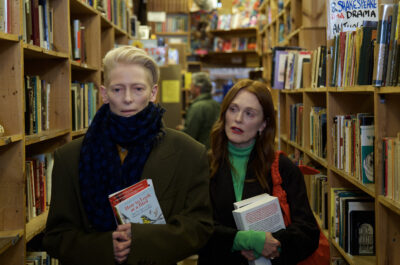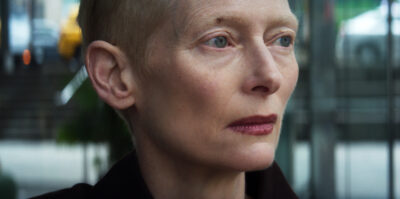“Resisting totalitarian aggression is necessary, but holding onto your humanity amid the onslaught is the ultimate pursuit of good. The making of this film — a film full of pathos and violence, porcini and dragonlets — is in and of itself this pursuit.
For its unwavering voice from inside the brutal war in Ukraine calling us to care about those who would sacrifice their lives to defend their humanity and ours, and since at present there is no Sundance Jury Award for best dog, the U.S. Grand Jury Prize: Documentary goes to Porcelain War.” — Sundance Film Festival Jury Statement (2024)
We open Porcelain War this Friday at the Monica Film Center. Co-directors Brendan Bellomo and Slava Leontyev will participate in Q&A’s following the 7:30 PM screenings on November 29 and 30. Film critic Robert Abele will moderate the Saturday Q&A.
Tickets for THE ROOM NEXT DOOR, Almodóvar’s first English-language film, go on sale on Friday.
On December 20th we are opening Pedro Almodóvar’s first movie in English, The Room Next Door, at the Royal. We’ll bring it to Claremont, Glendale, Newhall, North Hollywood, and Encino in January. Julianne Moore and Tilda Swinton star as two friends who reconnect after decades apart and embark on an unusual new phase of their friendship. Writing in Time Magazine, Stephanie Zacharek describes how “the colors of The Room Next Door are its secret message, a language of pleasure and beauty that reminds us how great it is to be alive. If it’s possible to make a joyful movie about death, Almodóvar has just done it.”

“The Room Next Door, as driven by the scalding humanity of Swinton’s performance, lifts you up and delivers a catharsis. The movie is all about death, yet in the unblinking honesty with which it confronts that subject, it’s powerfully on the side of life.” ~ Owen Gleiberman, Variety
“In these intensely moving moments it feels as if the two artists — [James] Joyce and Almodóvar — are connecting across time, desperate to express the ineffable, and keen to capture a creative moment that honours both the living and the dead.” ~ Kevin Maher, Times

“The Room Next Door turns into something spiky, unnerving, and at times joyously silly.” ~ Leo Robson, New Statesman
Almodóvar, Moore, and Swinton spoke about the film over the weekend at a Deadline Contenders panel discussion. “It’s wonderful. He really honors the female experience,” said Moore. “I think it’s something that he talks about, sitting under the kitchen table when his mother was talking to her friends and absorbing those stories and how powerful they were, and understanding that point of view. I think he’s always in that feminine point of view. Like I said, he honors that world. You feel very, very seen as an actor when you work with Pedro.”

“I’m a very dull or heady director,” said Almodóvar. “I say to the actors many, many, many things, and what I learned about these two is that perhaps I don’t need to say so much information to the actors. There was one very important [scene of Moore reading] the letter at the end. For me, it was very important. I was almost crying when I talked to her and I said, ‘Well, Julianne, this is what I want for this letter.’ [She] said, ‘Pedro, please let me do it, and after that, you give me all the indications.’ And she was right. When she just read it, I mean, I couldn’t believe it. I didn’t intervene, but it was more than perfect. So I learned by then that perhaps I don’t need to tell them so many things to the actors.”
Stephen Bogart and the BOGART: LIFE COMES IN FLASHES filmmakers in person for Q&A’s this week at the Royal and Town Center.
| Bogart: Life Comes in Flashes in-person Q&A’s with director Kathryn Ferguson: Friday, 11/15, 7:20 PM at the Royal, moderated by Grae Drake (Entertainment Journalist and Film Critic, Rotten Tomatoes & MovieFone); Saturday, 11/16, 7:10 PM show at the Town Center, moderated by Claudia Puig (NPR Film Critics/President L.A. Film Critics Association). Stephen Bogart will participate in a Q&A after the Saturday, 11/16, 1:20 PM show at the Royal; Scott Mantz (former Access Hollywood film critic) will moderate. |
Steve McQueen’s masterful BLITZ opens Friday.
Tomorrow we open Blitz, the latest film English filmmaker Steve McQueen (Shame, 12 Years a Slave, Occupied City), at the Claremont, Glendale, Monica Film Center, Newhall, and Town Center. Starring Saoirse Ronan, it follows the stories of a group of Londoners during the events of the British capital bombing in World War II. Top film critics have been singing its praises:
“I’ve been to whole film festivals with less cinema than Steve McQueen packs into just two hours.” ~ William Bibbiani, TheWrap
“The quiet puncturing of the myth of WWII solidarity on the homefront feels nearly as visceral a shock to the system… It’s not Blitz’s sensory-overload sturm und drang that leaves you gasping for breath. It’s the sneak attack.” ~ David Fear, Rolling Stone
“McQueen makes a point of integrating into the film what is rarely seen in movies of this sort: a sharp depiction of racism among Londoners, the enraging sort that has so calcified it still surfaces when people are just trying to survive.” ~ Alissa Wilkinson, New York Times
“Blitz is a welcome reminder that a bruised, searching and flawed home front, in the waning days of empire, was its own fascinating emotional terrain too.” ~ Robert Abele, Los Angeles Times
“This is a movie about the way resilience can blossom from vulnerability. No child asks to be a victim of war; sometimes survival, with your soul intact, is the best possible outcome.” ~ Stephanie Zacharek, TIME Magazine
“Blitz, while not exactly a movie for children, is nonetheless a story about a child, and it has powerful moments of wonderment, humor and even joy.” ~ Justin Chang, NPR
“Arguably the most heroic character in the film is the city. And Blitz is, instantly, one of the great “London Movies.” ~ Kevin Maher, Times (UK)
The delicately crafted queer Hong Kong drama ALL SHALL BE WELL opens Friday at the Royal.
“A picture of cruel realities. It’s a deliberate, nimble drama, one about major slights, class imbalance, and rampant homophobia.” ~ Robert Daniels, RogerEbert.com

“Anger is alien to Yeung’s style but it is sometimes justified, and without it, All Shall Be Well is a plea for understanding that should by now, by rights, be a demand.” ~ Jessica Kiang, Variety
“All Shall Be Well is undoubtedly an old-fashioned drama, but it is no less effective for that classic structure.” ~ Fionnuala Halligan, Screen International

“All Shall Be Well illustrates Yeung’s keen eye for the nuances of social dynamics, especially regarding matters of wealth and class that many may prefer to skirt around when it comes to family.” ~ Josh Slater-Williams indieWire
“Yeung’s latest feature is generous but never indulgent, taking the approachable genre of the family drama and placing it in the context of topical issues in today’s queer Hong Kong.” – Olivia Pope, Asian Movie Pulse
The “spiky, hilarious, and thoroughly unorthodox screwball comedy” BETWEEN THE TEMPLES is charming critics and audiences.
“A spiky, hilarious, and thoroughly unorthodox screwball comedy about a grief-stricken cantor who loses his voice, only to find that he’s surrounded by a chorus of well-intentioned people who are happy to speak for him.” ~ David Ehrlich, indieWire
“We get the sense that Silver would be perfectly happy just sitting there and watching these people forever, story and conflict and resolution be damned. And it really is in these characters’ close exchanges that the movie comes to life.” ~ Bilge Ebiri, New York Magazine/Vulture
“Between the Temples emerges as a quirky and effective showcase for two actors known for playing oddball characters. Kane and Schwartzman bounce off each other so well that their work alone makes the film worth seeing.” ~ Odie Henderson, Boston Globe
“The movie is consistently funny, but its humor tends to be fairly gentle because it’s rooted in human behavior rather than in condescending, judgmental ideas about such behavior.” ~ Manohla Dargis, New York Times
“Schwartzman is very affecting as a perplexed, tragicomic galoot and Kane is a marvel.” ~ Jonathan Romney, Financial Times
“Shot wanly on film in wintertime, Between the Temples takes a while to reveal its depths – its linguistic wit, its cockeyed humor and compassion, how it can modulate from deadpan-slapstick to achingly poignant and still feel authentic in both keys.” ~ Kimberley Jones, Austin Chronicle
“With both misery and comedy, director Nathan Silver satisfyingly captures the Jewish experience.” ~ Joey Shapiro, Chicago Reader
“The real attraction here is the interplay between the two leads, which makes Between the Temples sing.” ~ Randy Myers, San Jose Mercury News
Greg Laemmle and Raphael Sbarge Launch New Video Podcast INSIDE THE ARTHOUSE.
Greg Laemmle, President of Laemmle Theaters, along with actor and Emmy Award-winning director Raphael Sbarge, are launching a new Video Podcast called INSIDE THE ARTHOUSE. The show is dedicated to highlighting new releases, repertory classics, filmmakers, distributors, and the key personalities who bring movies to the big screen. INSIDE THE ARTHOUSE will be filmed and recorded at the Laemmle Royal Theatre, the 100-year-old theater that has been operated by three generations of Laemmles for the past half century.
Laemmle says, “My family has been dedicated to providing a home for independent, foreign and documentary film for almost a century, and we have decided to launch INSIDE THE ARTHOUSE in order to promote the release of new films that will ultimately play in arthouses all across the country.”
“Our interviews will be recorded in person or via Zoom, with filmmakers appearing large on the screen,” says Sbarge, an independent filmmaker himself. “Opening a movie in theaters requires all the support they can get, and INSIDE THE ARTHOUSE, is dedicated to the celebration of seeing films in theaters.”
Their first guests include Stephen Soucy, the director of MERCHANT IVORY, a documentary about art house mainstays Ismail Merchant and James Ivory; the Golden Lion-winning director of the Swedish film PARADISE IS BURNING, Mika Gustafson; the writer and director of PREY FOR ROCK AND ROLL, Cheri Lovedog and Alex Steyermark, re-released in theaters via Kino Lorber, for their 20th anniversary; and the co-directors of the new documentary UNION, out of the Sundance and Tribeca film festivals, Brett Story and Steven Main.
In subsequent episodes – initially to be released every two weeks – INSIDE THE ARTHOUSE will focus on new releases and repertory classics, filmmakers, distributors, and personalities who are responsible for bringing movies to the big screen. The first episode of INSIDE THE ARTHOUSE will premiere on August 28, 2024. The show can be found on YouTube and all major podcast platforms. For more information, visit www.insidethearthouse.com!
“I just wanted to look at that moment of girlhood where you are shifting away from being ostensibly under the protection of your parents, but also realizing like, ‘Oh, I’m actually not protected by the world. I have to figure out my own, my own way forward.’” India Donaldson on her new film GOOD ONE.
In India Donaldson’s fantastic debut film Good One, 17-year-old Sam (Lily Collias) embarks on a three-day backpacking trip in the Catskills with her dad, Chris (James Le Gros) and his oldest friend, Matt (Danny McCarthy). As the two men quickly settle into a gently quarrelsome, brotherly dynamic, airing long-held grievances, Sam, wise beyond her years, tries to mediate. But when lines are crossed and Sam’s trust is betrayed, tensions reach a fever pitch, as Sam struggles with her dad’s emotional limitations and experiences the universal moment when the parental bond is tested. Selected for both Sundance and Cannes’ Directors’ Fortnight, Good One is an emotionally expansive work that probes the limits of familial trust, understanding, and ultimately, forgiveness.
We open Good One this Friday in Santa Monica and a week from Friday in North Hollywood.
The nation’s film critics are not holding back. A small sample:
“Collias captures something gossamer here, a quiet shift into adult womanhood that happens, literally, overnight. She’s the new moon, ready to emerge. But unlike the moon, she makes her own light.” ~ Stephanie Zacharek, TIME Magazine
“In its lived-in quality and gathering churn, Good One is a dream of an indie, from the craft in every frame to the humor, epiphanies and mysteries that gird its portraiture.” ~ Robert Abele, Los Angeles Times
“Its most distinctive quality is how much Donaldson and her trio of actors … trust the subterranean, and allow it to do its work far beneath the surface, between the words.” ~ Sheila O’Malley, RogerEbert.com
“So much of the grace and, ultimately, the emotional resonance of Good One lies in Collias’ performance, and how she turns a symphony of reaction shots into a portrait of a woman caught in a crossfire of middle-aged male malaise.” ~ David Fear, Rolling Stone
“Subtly dark, humorous, and wise, Good One leans into its wilderness backdrop in all of its liberating (and, sometimes, paradoxically claustrophobic) properties.” ~ Tomris Laffly, Harper’s Bazaar
Donaldson has sat for several recent interviews to talk about her film. Here’s an excerpt from one with Jordan Raup of The Film Stage:
The best directorial debut of the year, India Donaldson’s Good One, is a carefully-observed portrait of both womanhood and fatherhood, capturing the 17-year-old Sam (Lily Collias, in a revelatory breakthrough performance) who embarks on a camping trip in the Catskills with her father (James Le Gros) and his best friend (Danny McCarthy). As the men are in the middle of a midlife crisis of sorts, Sam is witness to their mindless banter and subtle indecencies, culminating in a piercing point of no return.
Ahead of the film’s limited release beginning this Friday, I spoke with Donaldson about the character dynamics, the film’s subtle accumulation of details, the Hou Hsiao-Hsien and Kelly Reichardt films she watched as inspiration, and the journey from Sundance to New Directors/New Films to the Cannes Film Festival.
The Film Stage: Can you talk about how you initially formed the dynamic between these three characters? In some ways, it feels like an update on Old Joy but with an entirely new perspective.
India Donaldson: When I wrote the script, it was like deep COVID, and I was living back at home for the first time since high school, basically. And I have two half-siblings who at the time were in high school and I was kind of reflecting. I never thought about, before this moment, exploring that moment in film or writing. But through them this triangulation happened where I was reflecting on my own teen years and memories, of the ways that I dealt with conflict, the ways that I was avoidant of conflict, just my qualities of being in the world as a teenager. And how I felt like I had spent my 20s kind of trying to beat back certain instincts I had––to please or this kind of thing that had worked for me as a teenage girl, I feel like it wasn’t working for me in my professional life. I felt like I didn’t have the confidence to really pursue what I wanted to pursue, all these things. I just wanted to look at that moment of girlhood where you are shifting away from being ostensibly under the protection of your parents, but also realizing like, “Oh, I’m actually not protected by the world. I have to figure out my own, my own way forward.”
If you just look at the logline you could think it’s like a coming-of-age movie, but I feel like throughout the movie you learn she’s actually more mature in some ways, and level of maturity is not defined by age. She’s picking up on different social cues. What was it like writing her character and after you met Lily, did her character expand?
The character was on the page for sure, but the moment I met Lily and saw her audition, she just had added this edge to the character. I was always kind of nervous about the character that she would come across as too much of a doormat. That it would be sort of unsatisfying to watch somebody repeatedly act kind of in service of these men and their needs and struggle with that. Lily just had this quality where even when the character’s at her most obedient, I could always feel her pushing against it. Because I think Lily herself has a natural kind of rebellious [spirit]. She’s a real freethinker and has this incredible confidence that the character doesn’t have. But I think it bleeds into the performance and so it evolved in that sense. As soon as it was sort of in her hands, the character became more powerful to me. Which was a cool thing to discover.
- « Previous Page
- 1
- 2
- 3
- 4
- …
- 76
- Next Page »
